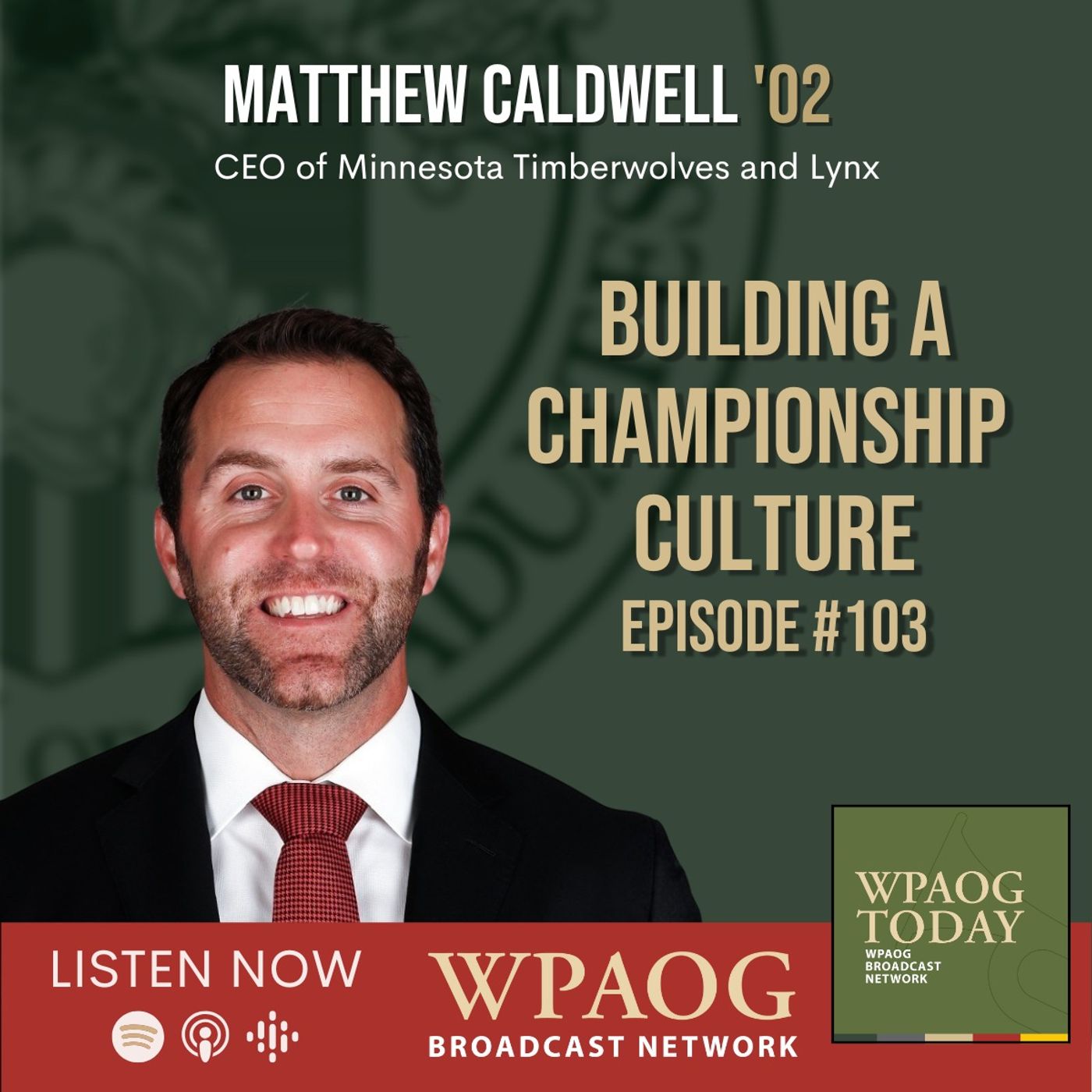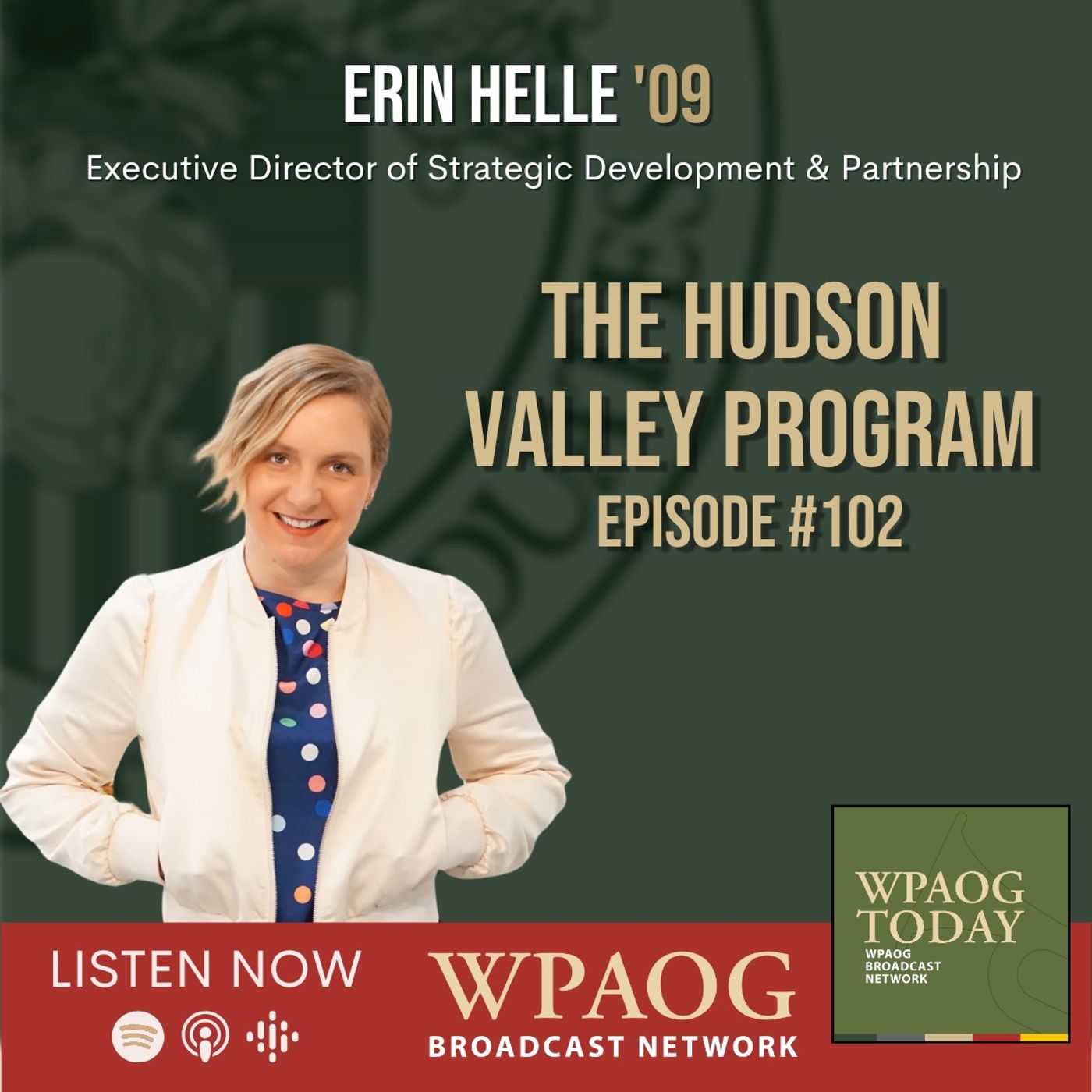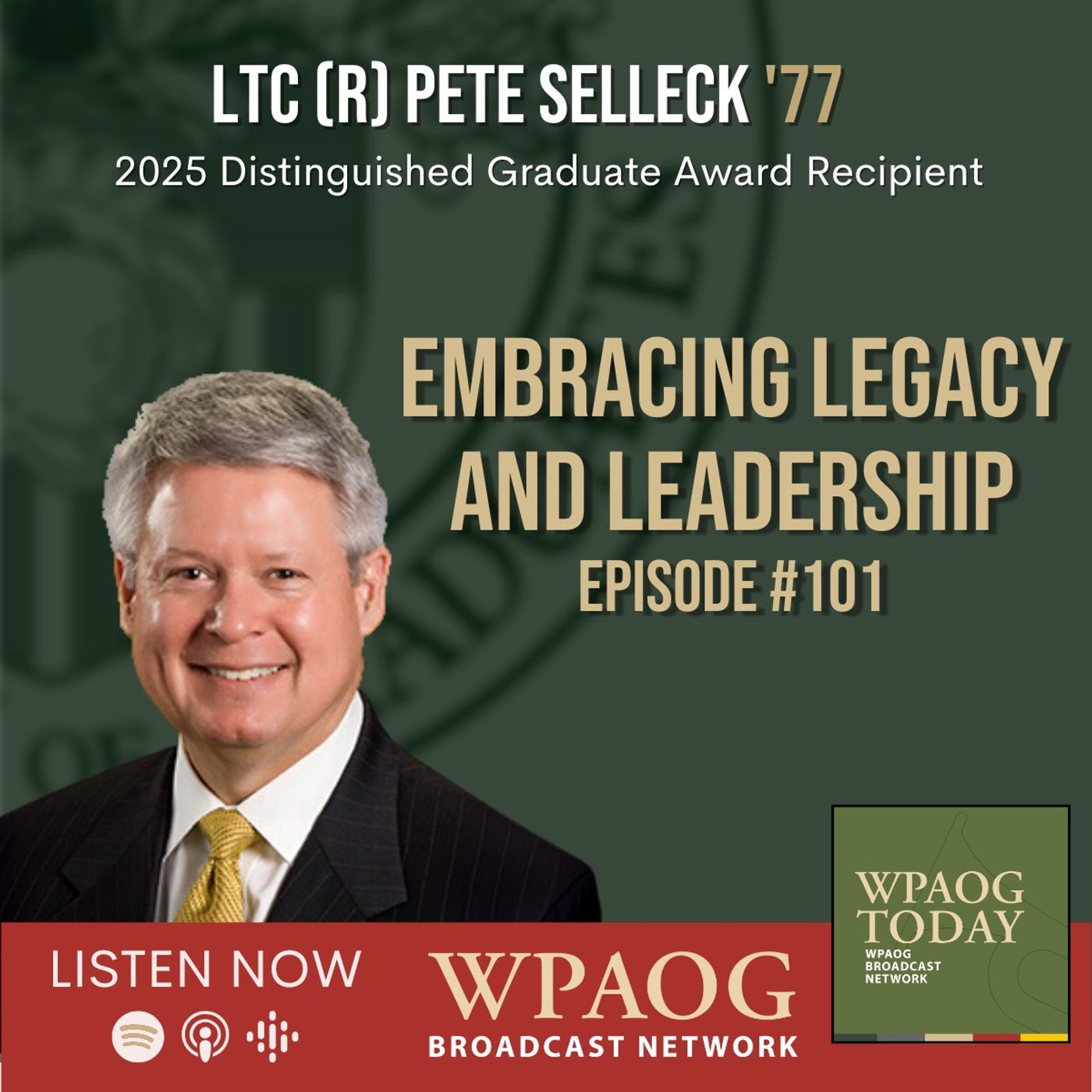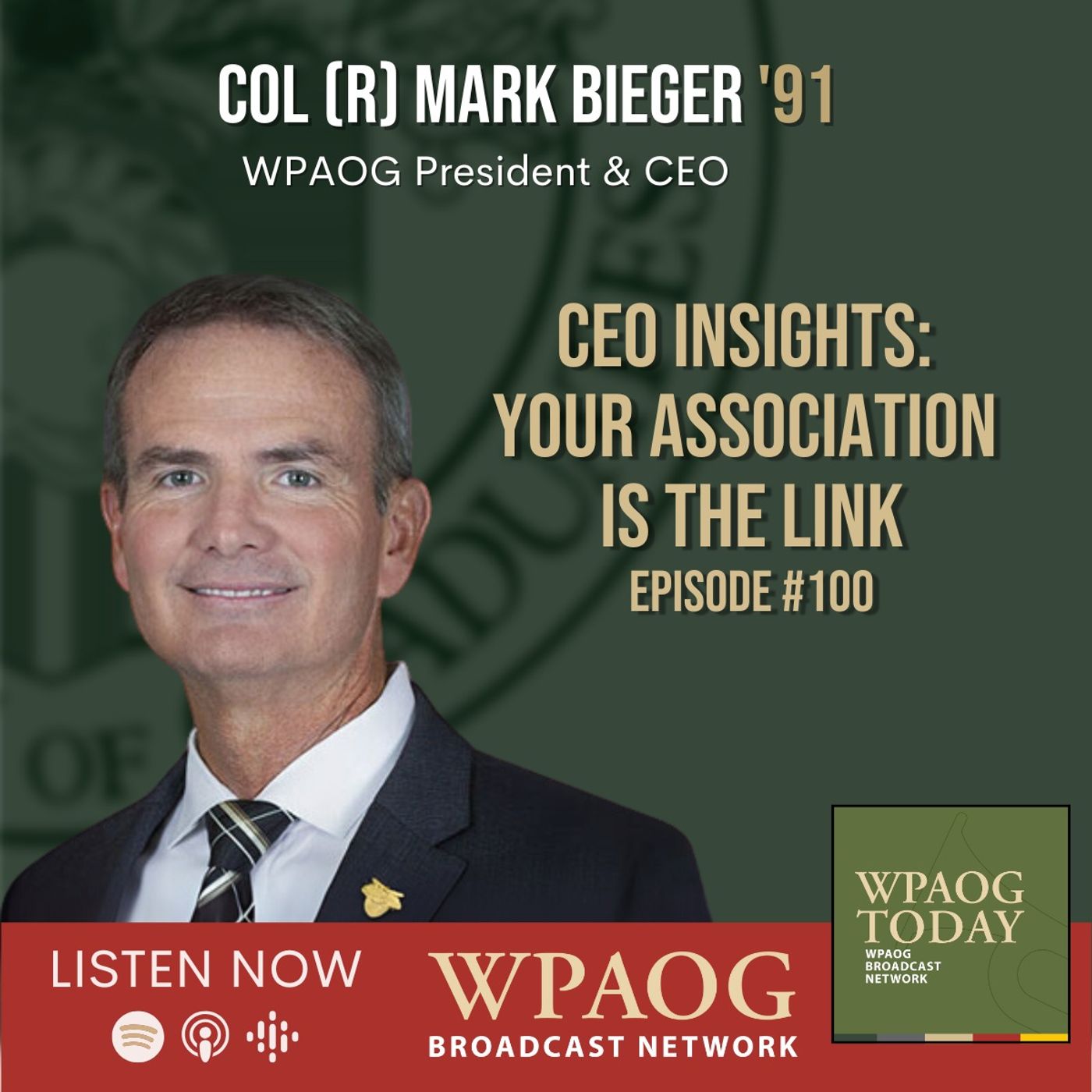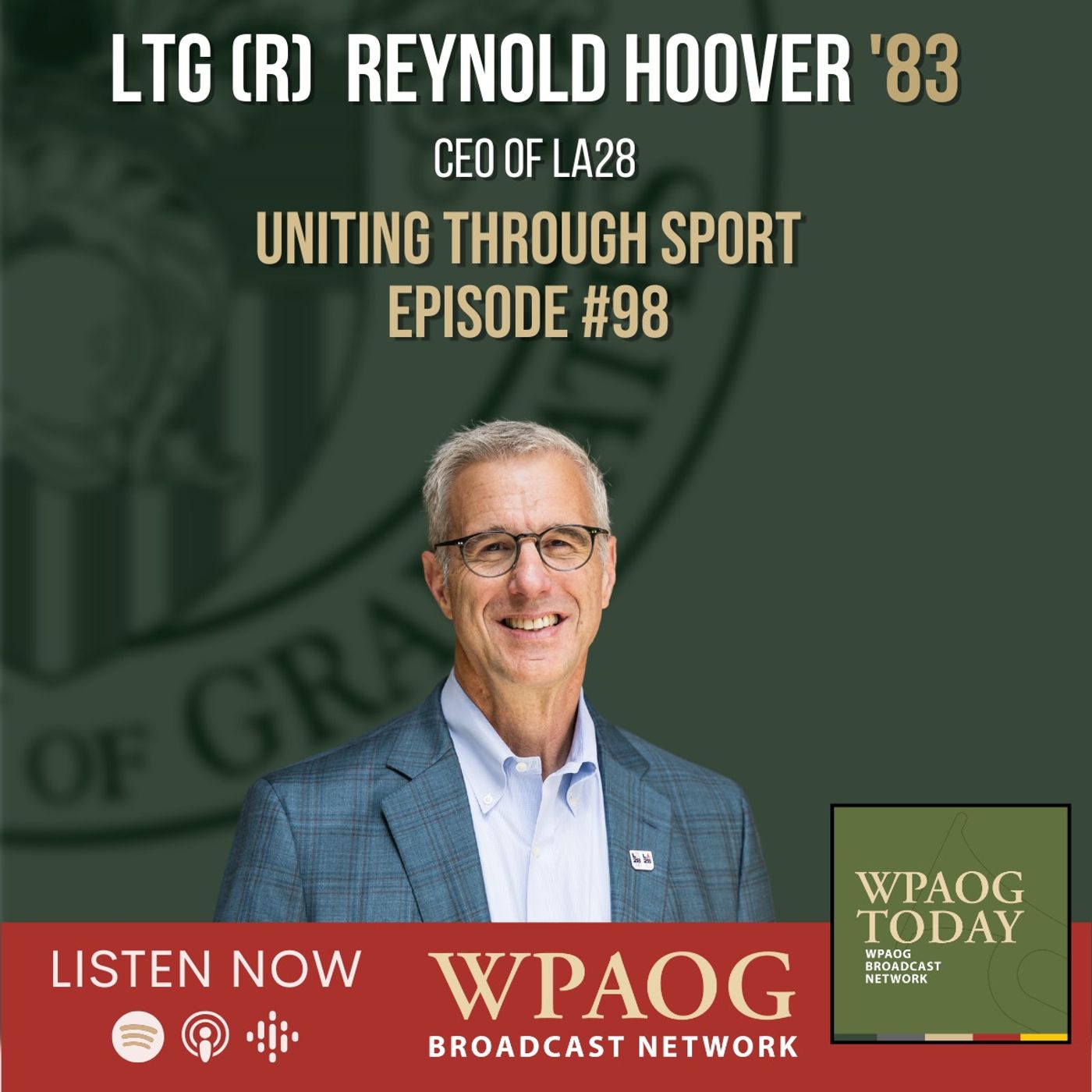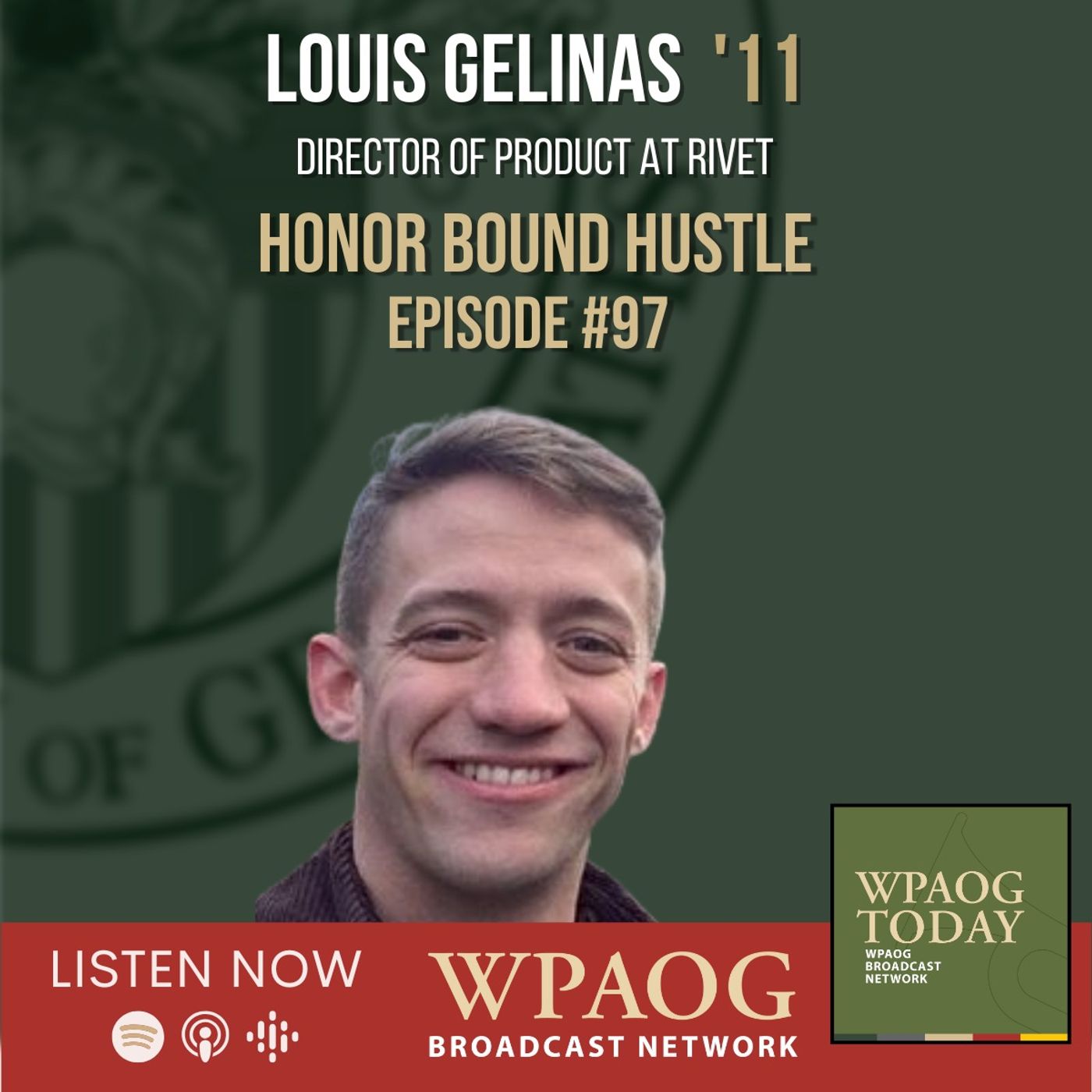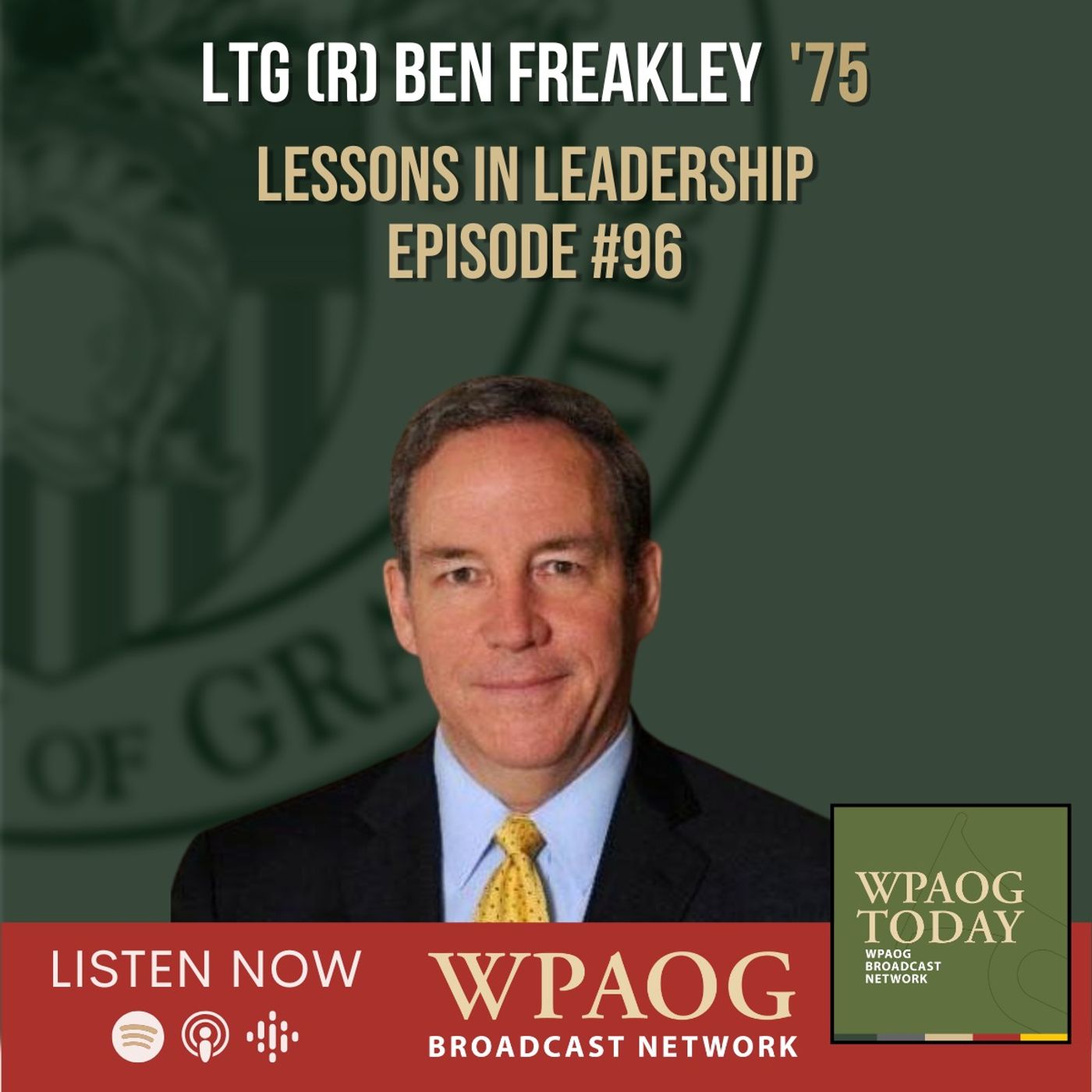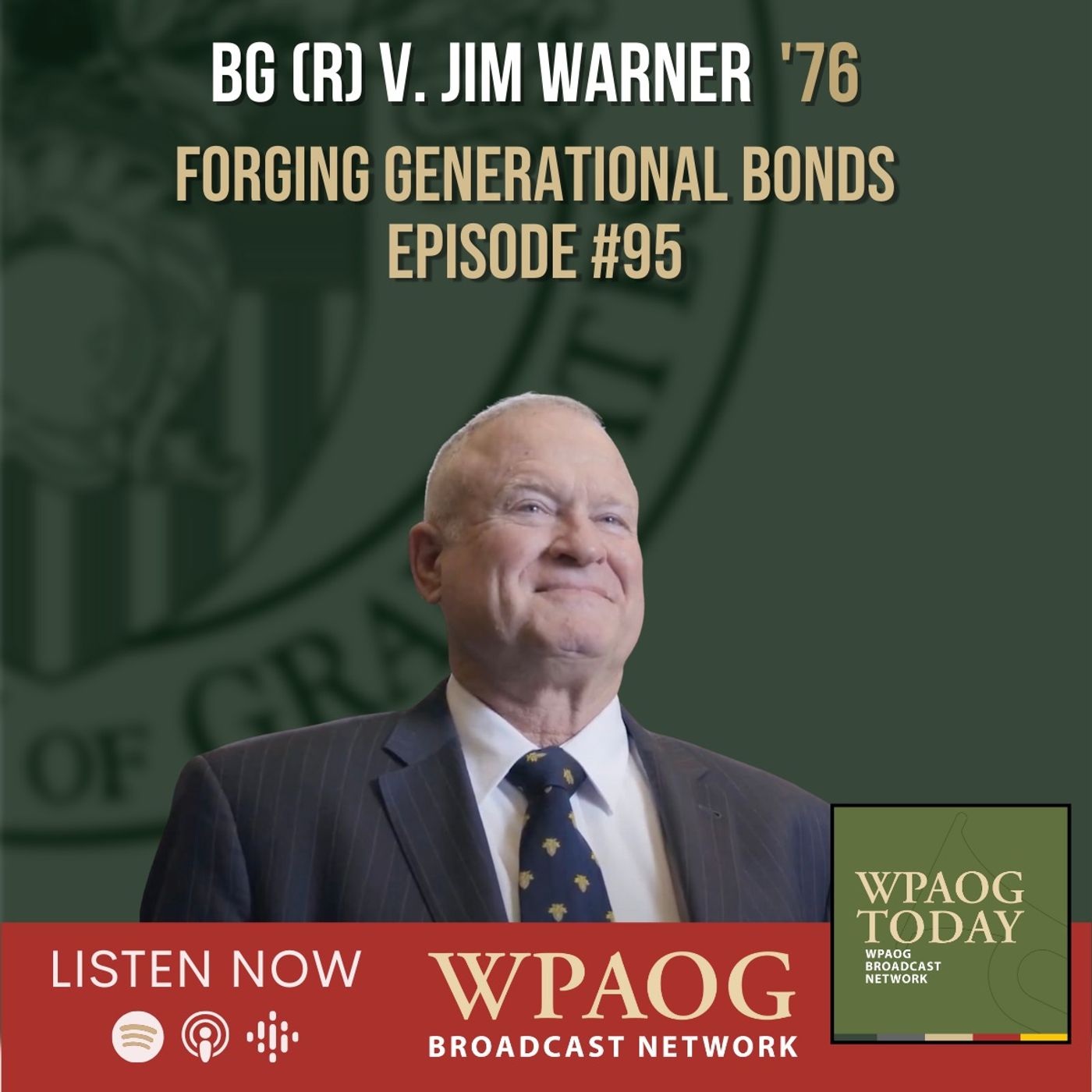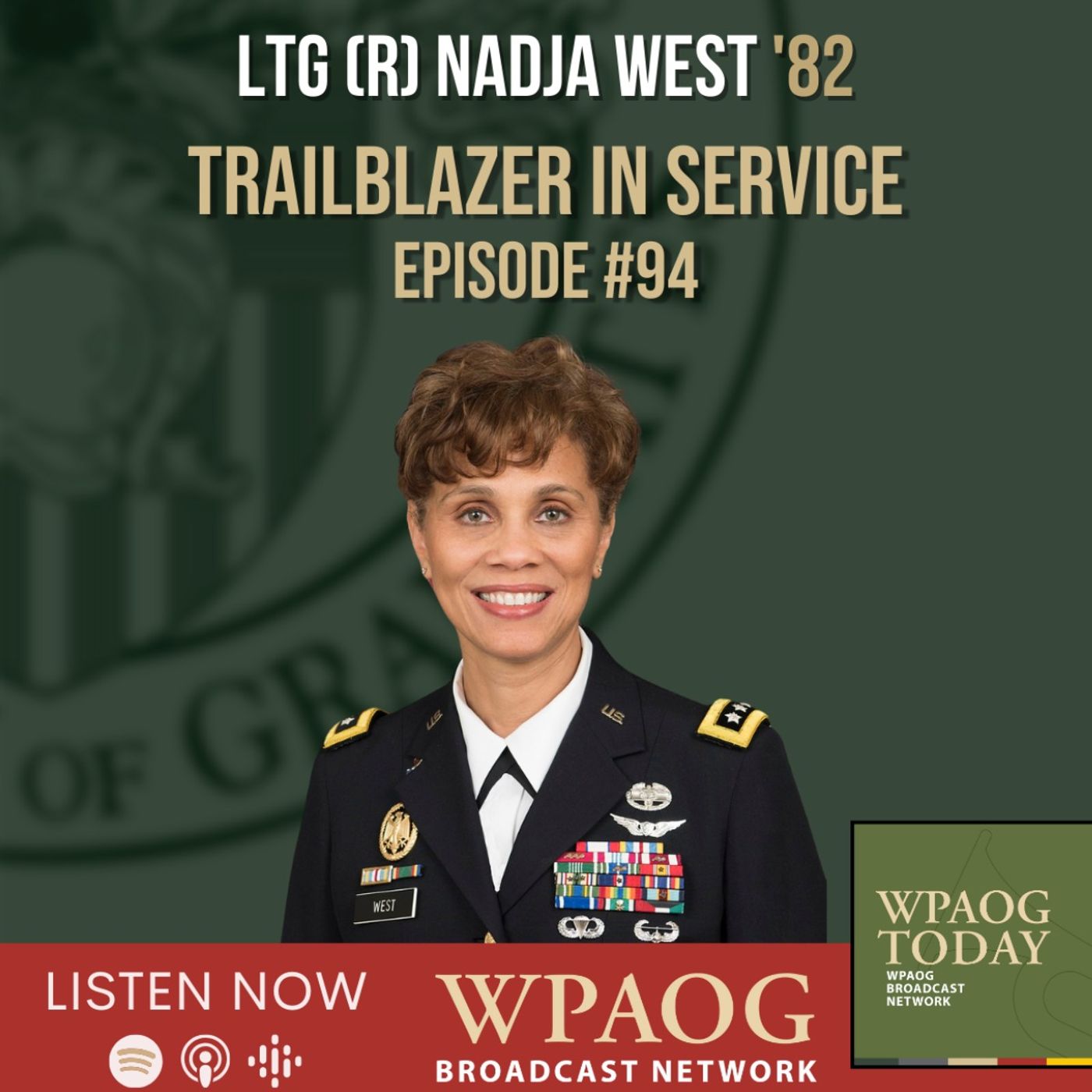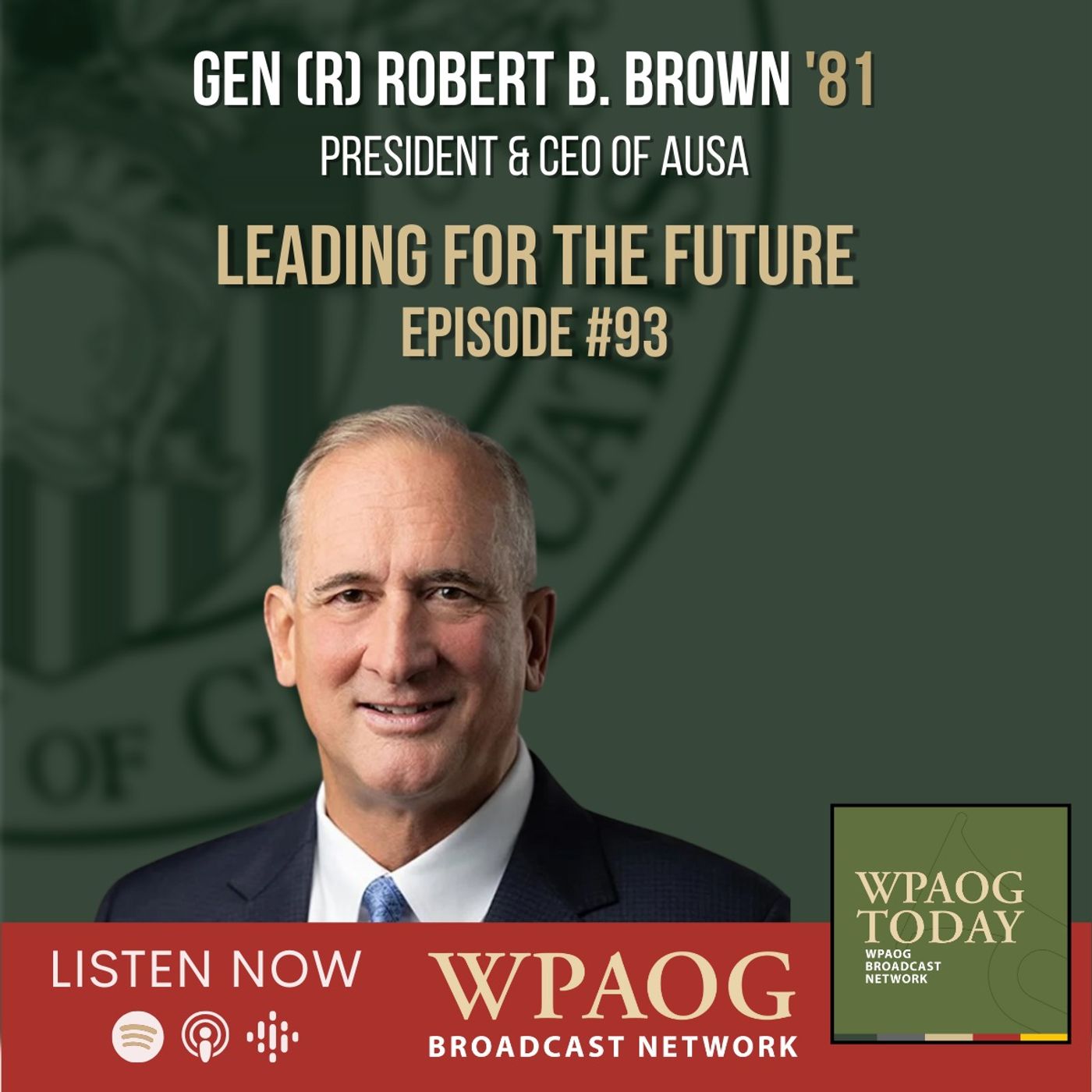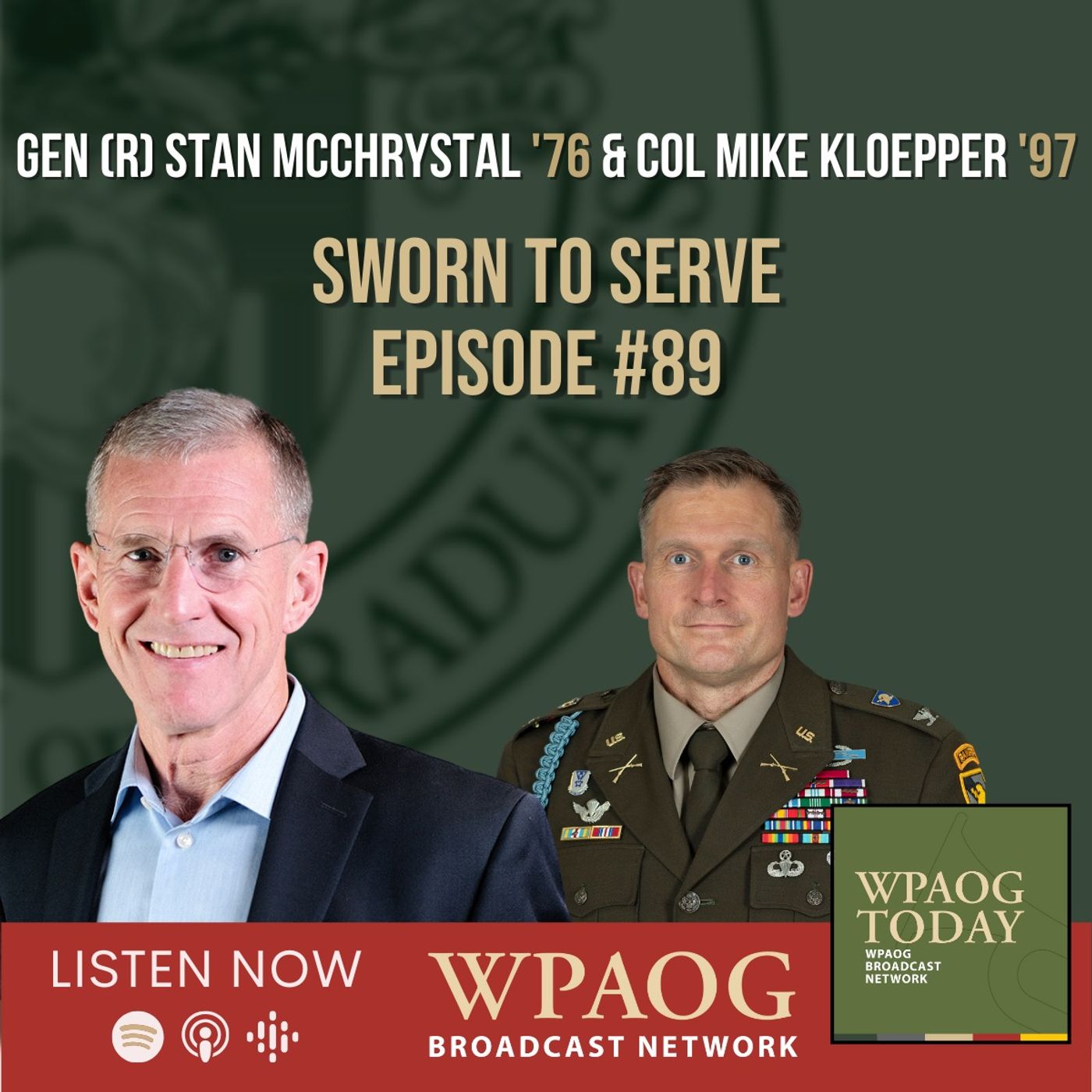Discover WPAOG Podcast
WPAOG Podcast

WPAOG Podcast
Author: West Point Association of Graduates
Subscribed: 9Played: 314Subscribe
Share
© Copyright 2021 All rights reserved.
Description
The WPAOG Podcast is a strategic initiative focused on tailored audible communications to further inform Graduates on current AOG projects, events, and USMA updates. This customized content is mainly for USMA Alumni and the West Point Community solely produced and distributed by the West Point Association of Graduates.
92 Episodes
Reverse
Episode Description:In this episode of the WPAOG podcast, we sit down with retired Lieutenant General Dan Karbler to explore his unexpected journey from commanding missile defense operations to working alongside Oscar-winning director Kathryn Bigelow on the national security thriller A House of Dynamite. The film brings cinematic intensity to a simulated missile attack on the U.S., and Karbler’s firsthand expertise shaped everything from the script to the set design, ensuring military authenticity at every turn.For nearly 37 years, LTG Karbler served our nation in a variety of positions in the United States and around the world. An expert in Air and Missile Defense and Space Operations, he has extensive experience in effectively leading large and complex military commands, conducting operations, requirements and capability development, test and evaluation, and budget formulation. Before retiring from the Army as a Lieutenant General, he led the U.S. Army’s Space and Missile Defense Command (SMDC), a globally dispersed organization across 23 locations and 11 time zones responsible for providing homeland and regional air and missile defense and space operations.Listeners will hear how a cold Zoom audition led to a major consulting role, what it takes to get military uniforms and terminology right for film, and how his leadership style aligned seamlessly with Bigelow’s directing approach. Karbler also reflects on what it means to serve, both in uniform and as a parent of two West Point grads, and shares advice for military professionals considering creative second careers. This episode offers a rare, behind-the-scenes look at the making of a military thriller through the eyes of someone who’s lived it—both on screen and in service.Give us your feedback by taking our short survey-Key Quote: “ When those curve balls come at you, or high pressure or complexity comes in, if you don't have that good basic foundation to fall back on, you start to make mistakes. You can get nervous, which is gonna affect your, uh, potential judgment or recommendations or could affect your decisions. So you have got to become the master of your craft. And you do that through repetition. You do that through practice, you do it through rehearsals, you do it by staying current with contemporaries, whether that's reading, listening to a podcast. Sometimes it's just, having a cup of coffee with friends and bouncing some ideas off of each other.”-LTG (Ret.) Dan Karbler– Episode Timestamps:(00:09) From General to Hollywood(03:20) On Set: Authenticity and Technical Advising(04:51) Behind the Scenes: Working with Kathryn Bigelow(17:04) Family Legacy: West Point and Military Service(25:19) Advice for Aspiring Military and Hollywood Careers–Links:Watch A House of Dynamite on Netflix
We’d love your feedback—take a minute to complete our short podcast survey and help us make future episodes even better! Hosted by Simplecast, an AdsWizz company. See pcm.adswizz.com for information about our collection and use of personal data for advertising.
In this episode of the WPAOG podcast, we sit down with West Point graduates Brian Anthony ’01 and Sean Mullin ’97, filmmakers and former Army officers, to explore the making of their new documentary Brothers on Three. The film captures more than a championship rugby season; it’s a story of resilience, identity, and brotherhood at West Point. Through the lens of the Army Rugby team, the film examines leadership under pressure and the power of trust, commitment, and love within a team.Brian Anthony is a West Point graduate who served in the U.S. Army from 2001 to 2010, including as a Ranger and Special Forces Green Beret. Today, he’s a screenwriter whose credits include CW’s Kung Fu, Constantine, The Night Shift, and Station 19. His comic book short Terps was featured in the SOLDIER STORIES anthology for Veterans Day 2022. Sean Mullin, also a West Point grad, served as an Army officer in Germany before finishing his service as a Captain in the New York Army National Guard, where he led soldiers at Ground Zero after 9/11. He later transitioned into filmmaking and comedy, building a successful career as an independent director and producer.Listeners will hear how Sean and Brian translated their shared experience on the rugby field into a powerful film narrative, the emotional revelations captured during filming, and the surprising leadership outcomes among Army rugby alumni. They also discuss the challenges of independent documentary filmmaking, from funding to field logistics, and reflect on the evolution of West Point’s culture of masculinity and emotional strength. The episode is a behind-the-scenes look at a deeply personal and cinematic tribute to the long-lasting bonds formed at the Academy.Give us your feedback by taking our short survey__Key Quote: ”One of the more kind of impressive stats that came out during filming, the typical West Point cadet has a 1% chance of getting promoted to the rank of general officer. But if you play rugby, you've got a 3% chance. So that's a 300% Delta, which is a massive Delta statistical anomaly. It's not even close, not double, it's triple. And I'll be honest with you, I started crunching more numbers, it's probably higher than three. So I feel confident saying that we've been, we've had a couple guys just get promoted recently, too. It's an incredible thing, and that was definitely something we wanted to investigate with this film is what's in the sauce. Why is that? I do feel like that's not just in the military chain of promotions. I do feel like also in the civilian world, you see a lot of business leaders and you see a lot of entrepreneurs who have a rugby background because again, there is a certain element of risk to this sport. And I think that translates well into people who maybe metabolize risk in a different way in the business world.” -Sean Mullin, Class of ’97__Episode Timestamps:(01:20) The Message Behind Brothers on Three(05:45) The Long Road to Making This Story Happen(08:30) Discovering Unexpected Moments of Brotherhood(14:20) Community Reactions and Premiere Plans(21:40) The Surprising Stats Behind Rugby and Leadership–Links:Find where Brothers on Three Playing Near YouConnect with SeanConnect with Brianhttps://www.westpointaog.org/news/podcast-from-ground-zero-to-hollywood-director-with-sean-mullin-97-award-winning-filmmaker/.
We’d love your feedback—take a minute to complete our short podcast survey and help us make future episodes even better! Hosted by Simplecast, an AdsWizz company. See pcm.adswizz.com for information about our collection and use of personal data for advertising.
In this episode of the WPAOG podcast, we welcome COL (R) James Lynch, MD West Point Class of ’89, a retired military physician and national expert in Stellate Ganglion Block (SGB). A promising treatment for PTSD and anxiety. With over three decades of military service, including 20 years in special operations, Dr. Lynch shares his journey from Army physician to mental health innovator.Dr. Jim Lynch is a physician and mental health advocate who established a practice in Maryland in 2021 after serving 31 years in Army medicine. Board-certified in Family and Sports Medicine, he’s treated thousands of trauma-affected patients and pioneered SGB as a powerful treatment for PTSD and anxiety. Dr. Lynch has presented internationally, published multiple peer-reviewed studies, and served as a U.S. Olympic Team physician for over a decade. He continues to champion access to effective trauma care for veterans, civilians, and underserved populations globally.Listeners will gain insight into how SGB works to reset the fight-or-flight system, its remarkable results among veterans, and why traditional PTSD treatments often fall short. Dr. Lynch also discusses the broader applications of SGB, including for survivors of sexual trauma, and how he’s taking this treatment global, reaching communities in crisis like Ukraine.Give us your feedback by taking our short survey– Episode Timestamps:(00:32) What is Stella Ganglion Blocks (SGB)(06:43) Discovery and Evolution of SGB for PTSD(12:27) Dr. Lynch's Journey into Medicine(16:56) Advice for PTSD and Anxiety Sufferers(23:06) Challenges and Accessibility of SGB(29:20) Dr. Lynch's Humanitarian Efforts –Links:Connect with Dr. JamesLearn more about SGBLearn more about WPAOG’s Veteran Services for West Point grads Information provided in this podcast is provided for educational and informational purposes only and does not constitute providing medical advice or professional services. The information provided should not be used for diagnosing or treating a health problem or disease, and those seeking personal medical advice should consult with a licensed physician. Always seek the advice of your doctor or other qualified health provider regarding a medical condition. If you think you may have a medical emergency, call 911 or go to the nearest emergency room immediately. No physician-patient relationship is created by this web site, podcast, or its use. Neither the West Point Association of Graduates nor its employees, nor any contributor to this web site or podcast, makes any representations, express or implied, with respect to the information provided herein or to its use.
We’d love your feedback—take a minute to complete our short podcast survey and help us make future episodes even better! Hosted by Simplecast, an AdsWizz company. See pcm.adswizz.com for information about our collection and use of personal data for advertising.
In this episode of the WPAOG Podcast, host Jamie Enos sits down with Matthew Caldwell, CEO of the NBA’s Minnesota Timberwolves and WNBA’s Minnesota Lynx. Matt brings a unique leadership background shaped by his service as a U.S. Army Captain, his time at Goldman Sachs, and nearly a decade as CEO of the Florida Panthers, where he helped lead the team to back-to-back Stanley Cup championships.Caldwell, a 2002 graduate of the United States Military Academy at West Point, also earned an MBA from Northwestern Kellogg School of Management and a J.D. from Northwestern University School of Law. He served five years in the U.S. Army, conducting combat operations in Iraq and peacekeeping in Kosovo. His business leadership has been widely recognized, including being named a South Florida Business Journal Ultimate CEO and receiving multiple “Forty under 40” awards. At just 36, he became the youngest CEO in U.S. pro sports when he took the helm of the Florida Panthers in 2016.This conversation explores the intersection of military discipline, entrepreneurial thinking, and executive leadership. Tune in to hear how Caldwell navigates organizational alignment, builds resilient cultures, and prepares to lead two professional basketball teams into a new era of growth and performance.Give us your feedback by taking our short survey.– Episode Timestamps:(01:31) Leadership Lessons from Military to Sports(03:38) Building from West Point Foundations(08:24) Mentorship and Support from the Long Gray Line(09:53) Entrepreneurial Ventures in Sports(13:05) Advice on Career Pivots and Transitions–Links:Connect with Matthew
We’d love your feedback—take a minute to complete our short podcast survey and help us make future episodes even better! Hosted by Simplecast, an AdsWizz company. See pcm.adswizz.com for information about our collection and use of personal data for advertising.
In this episode of the WPAOG Podcast, we’re joined by Erin Helle, AOG’s Executive Director of Strategic Development and Partnerships, about the bold efforts underway to transform Highland Falls and reforge the connection between the West Point community and its neighboring town. Erin shares the mission and vision behind the Hudson Valley Program, how AOG is investing in long-term community investment, and why this work is as strategic as it is deeply personal.From developing the CONNECT after-school program to forging productive partnerships with local leadership and developers, Erin outlines how trust building, infrastructure investment, and shared purpose are reshaping the Gateway to West Point. With a blend of authenticity and strategic insight, she reflects on what it takes to lead sustainable, community-first development and what success will look like five years from now.Listeners will gain a grounded perspective on place-based leadership, relationship-driven progress, and the long-term impact of aligning institutional values with community needs. This episode is essential listening for professionals working at the intersection of civic development, education, and strategic partnerships.Give us your feedback by taking our short survey– Episode Timestamps:(00:19) The Mission and Vision of the Hudson Valley Program(03:15) The Connect Program: Impact and Benefits(09:32) Key Partnerships and Collaborations(18:56) Breaking Through Challenges and Overcoming Obstacles(23:26) The Future Vision and Long-Term Goals–Links:Connect with ErinConnect with JamieHudson Valley Program: https://www.westpointaog.org/connections/wpaog-hvp-overview/.
We’d love your feedback—take a minute to complete our short podcast survey and help us make future episodes even better! Hosted by Simplecast, an AdsWizz company. See pcm.adswizz.com for information about our collection and use of personal data for advertising.
In this episode of the WPAOG Podcast, we sit down with LTC (R) Pete Selleck ’77, 2025 Distinguished Graduate Award recipient, to explore his extraordinary journey from West Point to global business leadership. With a legacy rooted in service, Selleck shares how his cadet experience shaped his values, influenced his leadership approach, and fostered lifelong connections. From commanding troops to mentoring the next generation, he reflects on the enduring power of purpose and community.Selleck is a monumental example of distinguished service to America across the private, governmental, and non-profit sectors. Commissioned into the U.S. Army Corps of Engineers, he served in the 4th Engineer Battalion, 4th Infantry Division, before transitioning to the U.S. Army Reserve. He then began an extraordinary 35-year career at Michelin, culminating in his role as chairman and president of Michelin North America. His efforts were critical in supporting the Department of Defense during the Iraq War, supplying combat-grade tires for the MRAP vehicle—a contribution that saved countless lives. Beyond his corporate achievements, Selleck has dedicated decades to supporting West Point through admissions, alumni leadership, endowments, and community service. As LTG (R) Walter Ulmer ’52 said, “Few graduates in our history have amassed such a record of broad consequential achievement.”Listeners will come away with timeless leadership lessons on humility, accountability, and mission-driven work—from building elite teams to aligning personal purpose with organizational impact. This episode is essential listening for current and future leaders in military, corporate, and non-profit spheres alike.--Key Quote:“ I knew that West Point really put an emphasis on leading people, and that turned out to be exactly right, and the leadership experience as a cadet, the things that you do as a young officer, as a platoon leader, as a company commander, those things are unparalleled. The type of responsibility you get as a 20-year-old is just amazing, and that just played out big time as I went into my Michelin career that it was just, you become a very natural leader because you do it. You can't learn leadership in a book. You have to actually do it. You've gotta make mistakes. You've gotta see successes, you've gotta watch other people. And that really played a huge role in my subsequent life after the Army. But I will say that being a company commander in the Army was probably the most challenging leadership job that I ever had. It was big, big responsibility.” -LTC (R) Clyde A.“Pete” Selleck III, class of 1977– Episode Timestamps:(00:21) Continuing the Family Legacy at West Point(04:53) Leadership Lessons from West Point to Michelin(09:38) Defining Service to the Nation(12:52) The 50-Year Affiliation Program and Legacy(26:31) Lending Support to the West Point Admissions(30:40) Advice for Future Leaders–Links:2025 Distinguished Graduate Award RecipientsConnect with Pete
We’d love your feedback—take a minute to complete our short podcast survey and help us make future episodes even better! Hosted by Simplecast, an AdsWizz company. See pcm.adswizz.com for information about our collection and use of personal data for advertising.
In this episode of the WPAOG Podcast, we sit down with Mark Bieger, President and CEO of the West Point Association of Graduates, member of the Class of 1991, and West Point parent. From his early leadership development as a cadet to commanding troops in combat and now leading one of the Academy’s most mission-driven organizations, Bieger shares thoughtful reflections on service, connection, and building community across generations of West Point graduates. His leadership journey underscores a profound respect for tradition and a clear-eyed vision for innovation and impact.Bieger’s path is rooted in nearly 29 years of service in the U.S. Army, where he commanded at every level from platoon to brigade including combat operations in Iraq. He later brought his strategic acumen to higher education, serving in senior leadership roles at the University of South Carolina and Louisiana State University. Now, as CEO of WPAOG, he leads with a commitment to transparency, mission alignment, and serving both the Academy and the Long Gray Line. His approach blends operational excellence with deep empathy and an unwavering belief in the power of connection.Listeners will gain insight into how Bieger balances tradition with innovation, how AOG programs are creating powerful generational bonds, and how the organization defines success through the eyes of its graduates. This episode is a must-listen for leaders in nonprofit strategy, alumni engagement, and anyone who values mission-first leadership grounded in service.--Key Quote:“ My one request of our graduates, that I repeat over and over, is to be connected. Connect with your classmates, if you haven't in years, connect, reconnect, strengthen that bond that exists in the class. Connect with your alma mater. Connect with our great Academy. And then in whatever way inspires you, connect with your Association. I think those connections will be rewarding, they'll make you feel really good about the path that you've been on, and it will inspire you for thoughts about what to do in the future.”-Mark Bieger, WPAOG President & CEO--Episode Timestamps:(00:53) West Point Association of Graduates: Mission and Vision(03:18) Defining Success and Leadership Principles(07:11) Balancing Tradition with Innovation(12:54) Supporting the Academy and Developing Leaders(17:22) Philanthropy and Alumni Engagement(23:38) Encouraging Connections and Final Thoughts--Links:Connect with MarkLearn More about WPAOG
We’d love your feedback—take a minute to complete our short podcast survey and help us make future episodes even better! Hosted by Simplecast, an AdsWizz company. See pcm.adswizz.com for information about our collection and use of personal data for advertising.
In this episode of the WPAOG Podcast, we sit down with Kathleen Widmer, class of 1983, and a 2025 Distinguished Graduate Award honoree. From helping launch the Women’s Lacrosse team as a cadet to leading in both the military and private sector, Widmer shares powerful stories of perseverance, leadership, and service. Her journey reflects a deep commitment to others and a belief that real leadership starts with humility and humanity. Widmer’s path is defined by lifelong service and standout leadership — from breaking barriers as one of West Point’s early women graduates and a pioneering field artillery battery commander, to shaping healthcare access as a senior executive at Johnson & Johnson. She was instrumental in forming the Women’s Lacrosse Team at the Academy, led veteran hiring programs in corporate America, and helped restore the Wounded Warrior Project as board chair. Through it all, she’s remained a committed supporter of West Point, exemplifying the values of the Long Gray Line across every chapter of her life. Listeners will gain insight into how West Point prepared her for command and crisis leadership, how she led teams through the pandemic and major corporate transformations, and why she believes the most effective leaders lead with their humanity. This episode is a must-listen for professionals, leaders, and cadets who want to learn what it truly means to lead with impact.--Key Quote:“ The other thing that West Point really did for me that helped me in industry is you build stamina at West Point. You don't get to opt out of hard stuff. You have to do everything. You have to get up every day early. You have to follow a schedule that puts too many things in front of you to do, then you can actually accomplish, and you have to filter all the time what's important and focus on those things. And, you know, being a senior leader in industry is the same. If you try to do everything instead of prioritizing and filtering, and figuring out. What's important, you, you just sort of run yourself in circles. And honestly, don't accomplish much. But there's a, there's a stamina that you build at West Point, and it's the same kind of stamina that I think you have to have in industry to be, every 30 minutes somebody's giving you dense, complex information that you need to make a decision about. And then 30 minutes later, it's a completely different topic, and they're doing the same thing. And then it's the next 30 minutes, and it's sort of like you need to train for it, and West Point prepares you for that.”--Episode Timestamps:(00:50) Following the Family Tradition and Decision to Attend West Point(03:51) Kathleen’s First Days at West Point(08:00) Founding of the Army Women's Lacrosse Team(15:24) Leadership Lessons from West Point(19:07) Transition to Civilian Career and Leadership in Industry(33:09) Advice for Current Cadets–Links:Connect with KathleenView all of the 2025 Distinguished Graduate Award Nominees
We’d love your feedback—take a minute to complete our short podcast survey and help us make future episodes even better! Hosted by Simplecast, an AdsWizz company. See pcm.adswizz.com for information about our collection and use of personal data for advertising.
On this episode of the WPOG podcast, LTG (R) Reynold Hoover, CEO of LA28 and West Point class of 1983, unpacks the leadership, planning, and execution strategies powering the largest Olympic and Paralympic Games in history.As the CEO of LA28, the Organizing Committee for the 2028 Olympic and Paralympic Games in Los Angeles, Hoover oversees the planning, delivery, and execution of the Games since June of 2024. Hoover has held various senior civilian roles in the U.S. federal government and leadership positions in the U.S. military, including as a three-star Lieutenant General. He has led the United States through some of its most complex logistics operations and was awarded the highest non-combat award in the Defense Department. Hoover graduated from the United States Military Academy at West Point in 1983 and holds master’s degrees in Public and Private Management from Birmingham Southern College and in Strategic Studies from the U.S. Army War College. He also received his law degree from The Catholic University of America’s Columbus School of Law.Whether you're interested in leadership, logistics, or legacy-building, this episode offers unmatched perspective into how the Olympics are evolving—and why LA28 is setting a new global benchmark.--Key Quote:“ It is the reason I came outta retirement. And got off the couch because, on the 2nd of July, 1979, I took an oath on the plain at West Point, like many West Pointers before and after me have done. To a life of public service, and I couldn't think of a better way to capstone a career of over 35 years in uniform and another four as a cadet, so close to 40 years, to come back and unite the world around sport and unite the nation around sport and unite all of Angelenos and Southern California around sport movement.”-LTG (R) Reynold Hoover, CEO of LA28– Episode Timestamps:(00:18) Reynold's Military Career Highlights(02:33) Transition to LA 28 Olympics(06:22) Challenges and Scope of LA 28(09:49) Applying Military Principles in Olympic Planning(22:28) Balancing Tradition and Innovation(28:00) Why LA28 is “America’s Games”:–Links:Connect with HooverLearn more about LA28
We’d love your feedback—take a minute to complete our short podcast survey and help us make future episodes even better! Hosted by Simplecast, an AdsWizz company. See pcm.adswizz.com for information about our collection and use of personal data for advertising.
In this episode, Louis Gelinas, West Point Class of ‘11, shares how his Army experiences, especially managing people and operations under pressure, shaped his entrepreneurial path. Currently, the Director of Product at Rivet — a workforce management platform for trade contractors — was born from a simple but powerful idea: solve a real-world problem with the tools he wished he had in uniform. Louis also highlights the crucial role the West Point Entrepreneurs group played in helping Rivet navigate early challenges, secure vital connections, and ultimately hit key growth milestones.Louis studied History and Chinese before serving as an infantry officer with assignments in Italy, Afghanistan, Ukraine, and Korea. After eight years on active duty — and growing his family to include four children — Louis returned home to Detroit, Michigan, to launch the next chapter of his career. Doubling down on his software development skills, he teamed up with local entrepreneurs to cofound Rivet, a workforce management platform built specifically for trade contractors. Today, as Director of Product, Louis leads a team of engineers, designers, and product managers, channeling the lessons from his Army days into building a platform designed to empower America's skilled trades workforce.Throughout the conversation, Louis talks candidly about the challenges of staying focused in the fast-paced world of startups, how West Point’s leadership lessons still guide his decision-making, and why curiosity and community are critical to entrepreneurial success. From the early days of Rivet’s scrappy beginnings to winning the confidence of investors and customers, Louis’s story is full of valuable insights for anyone looking to build something that truly serves others. Plus, we dive into how staying relentlessly mission-focused — even when things get tough — can make all the difference.-Key Quote:“ Company Commander time is really where you get the heat of like the prioritization, ideally your company commander and your battalion commander are the people who are being like, there's 10 priorities, but we're gonna be able to really make time to be good at three of them. And as a platoon leader, ideally, you get to focus on the one thing we're gonna be training on.This is gonna be our key task, this is gonna be our mission. But a big part of it is like somebody else decided to filter out the like 17 other things. The various aspects of the Army is gonna ask you to do. And that like intense focus on prioritization is like very important even as a Company Commander, is that you can kind of figure out like if you picked the right thing to focus on like not only do you succeed in your mission, but everybody's okay with the fact that you put a ‘C’ into, you know, this aspect of the third thing on the list because you did the most important thing. What is the most important thing is always gonna serve you well.”-Louis Gelinas– Episode Timestamps:(01:19) Louis’ West Point Career and Transition(04:21) Founding Rivet: Inspiration and Team Formation(08:32) The Impact of West Point Entrepreneurs(14:09) Advice for Aspiring Entrepreneurs(26:01) The Future for Rivet–Links:Learn more about the West Point Entrepreneurs GroupConnect with LouisLearn more about Rivet
We’d love your feedback—take a minute to complete our short podcast survey and help us make future episodes even better! Hosted by Simplecast, an AdsWizz company. See pcm.adswizz.com for information about our collection and use of personal data for advertising.
What does it take to be a great leader? In this episode, host Jamie Enos sits down with Lieutenant General (Ret.) Benjamin Freakley to unpack the essence of leadership, trust, and lifelong service. From his days at West Point, class of 75’, to commanding troops in combat, General Freakley shares hard-earned wisdom on building trust, listening to those around you, and leading with integrity. He also reflects on the unbreakable bond of the Long Gray Line, the power of mentorship, and how West Point shapes leaders not just for the Army but for a lifetime of service, the tenets of being on the Long Gray Line don’t end at graduation, but serve your lifetime. Lieutenant General Benjamin C. Freakley serves as a Professor of Practice of Leadership at Arizona State University and a Special Advisor to ASU President Michael Crow. He co-founded the ASU Leadership, Diplomacy, and National Security Lab after retiring from the U.S. Army with over 36 years of service. A graduate of West Point class of 1975 and former Commanding General of the U.S. Army Accessions Command, he was responsible for worldwide recruiting and ROTC programs. Throughout his career, he led U.S. and international forces in combat, commanded at all levels, and played a key role in shaping future military leaders. His leadership experience spans from Operation Desert Storm to commanding forces in Afghanistan, and today, he continues to develop leaders both inside and outside the military.The conversation also dives into General Freakley’s involvement with West Point’s 50-Year Affiliate Program and why mentoring the next generation of Army officers is critical. He shares invaluable advice for young leaders navigating their first roles in the Army—emphasizing the importance of humility, trust, and learning from non-commissioned officers. Tune in to hear why leadership is a lifelong commitment, how West Point’s values endure far beyond graduation, and what it truly means to serve.Key Quote: “ The essence of leadership of all the things we do is trust. Women and men either trust you or they don't. In and out of combat, it always just struck me that even an arduous training, a noncommissioned officer would ask her soldiers to do something and they would do it. And I would just reflect on, you know, why are they doing this? Why are they taking this chance? Why are they doing what they're being asked to do in and out of combat, and the essence of leadership is trust. And how do you get that trust? Integrity, competency, and getting results. You have to be a leader of integrity. You have to live the honor code at West Point your entire life. And women and men will follow leaders who are competent. We don't like to waste our time. We don't like to be caught up in inefficient moments. We don't like to walk up into a complete disaster of a mess and say, ‘what's going on here.’ We like to be around people who know what they're doing, who know their stuff and, and then leaders have to get results and people want to be on a team that wins.”-LTG (R) Ben Freakley ’75Episode Timestamps:(0:26) Inspiration and Early Influences(02:47) Leadership Philosophy(04:45) For our Future Leaders(10:57) How Family Can Mold Leadership(15:32) The Long Gray Line and Lifelong Service–Links:Learn More About Lt. Gen. Benjamin Freakley
We’d love your feedback—take a minute to complete our short podcast survey and help us make future episodes even better! Hosted by Simplecast, an AdsWizz company. See pcm.adswizz.com for information about our collection and use of personal data for advertising.
On this week’s episode, host Jamie Enos sits down with Brigadier General (Ret.) Jim Warner, Class of 1976, to explore a legacy of the Long Gray Line that spans generations. From his father’s improbable journey from a Depression-era farm boy to a four-star general to Warner’s path through West Point, this conversation is a masterclass in resilience, leadership, and commitment to service. Warner’s reflections on the Academy’s past and present—shaped by his experiences as a cadet, an officer, a class president, and a mentor—highlight West Point’s enduring mission to develop leaders of character. His powerful decision to donate both his and his father’s West Point rings to the Class of 2026’s Ring Melt Ceremony underscores the deep connection graduates share across time.A distinguished leader in both military and civilian spheres, Brigadier General (Ret.) Jim Warner has spent his career developing learning organizations that drive mission success. As Chief Learning Officer of the Veterans Health Administration, he led the nation’s largest Continuing Medical Education program, delivering over 6 million CME credits to hundreds of thousands of healthcare professionals. His leadership extended to the U.S. Army Command and General Staff College, where he shaped the professional development of officers and Army civilians worldwide. Warner’s military career included key command and operational assignments in combat zones, as well as strategic planning roles shaping national defense policy. His deep commitment to mentorship, education, and leadership development is evident in his work, ensuring that both soldiers and civilians continue to learn, grow, and serve with excellence.This episode isn’t just about history; it’s about the future. Warner speaks passionately about the next generation of West Point leaders and their remarkable potential. With stories of courage, mentorship, and the unbreakable bonds formed at the Academy, he reminds listeners that West Point is not just an institution—it’s a force that shapes the character of those who will go on to shape history. Whether you’re a graduate, a prospective cadet, or simply someone who appreciates stories of perseverance and purpose, this episode is one you won’t want to miss.Key Quote:“If you really want to accomplish something, it's about what you do with others, and how they respond to you and how you respond to them. So, that's one thing. The one enduring aspect of the West Point experience, I think, goes to first, the ethics of duty, honor, country, the notion that if you're going to be successful, in your own eyes, you've got to do it be able to be part of something bigger than yourself, something that's going to last longer than you do, that you can build something that carries forward to [the] future.”– Brigadier General (Ret) Jim WarnerEpisode Timestamps:(00:32) The Family Legacy at West Point(09:25) Jim's Path to West Point(13:34) Ring Memorial Program(20:01) Leadership Philosophy and Career(25:56) Mentorship and Influences–Links:Connect with Brigadier General Jim Warner
We’d love your feedback—take a minute to complete our short podcast survey and help us make future episodes even better! Hosted by Simplecast, an AdsWizz company. See pcm.adswizz.com for information about our collection and use of personal data for advertising.
In this episode of the WPAOG podcast, we are honored to speak with retired LTG. Nadja West, a trailblazing leader and West Point graduate from the Class of 1982. LTG. West shares her journey from cadet to becoming the Army Surgeon General and the first Black woman to achieve the rank of Lieutenant General in the U.S. Army. Her experiences provide valuable insights into leadership, resilience, and the importance of service to others.LTG. West’s career is a remarkable story of firsts. As the Army Surgeon General, she led a vast organization with an $11 billion budget, overseeing 130,000 healthcare professionals who served more than 4 million beneficiaries. Her service included pivotal moments in military history, such as Desert Storm and the wars in Iraq and Afghanistan. A dedicated mentor, she reflects on how her upbringing and West Point education shaped her approach to leadership and inspired others to achieve their potential.This episode explores themes of perseverance, inclusion, and values-driven leadership. LTG. West discusses the importance of staying grounded, serving with integrity, and helping others succeed. Her reflections on her career and her continued commitment to mentorship offer inspiration to listeners of all backgrounds. Key Quote:“I think the hardest thing, the hardest lesson I learned, is that I got in my own way more than anyone else could have. That self-talk, that negative voice—'Why am I here? I don't belong here. I shouldn't be here. This is too tough.' A lot of that negative self-talk. As a leader, trying to recognize that in others and bring them out of it is important. You lead a whole diverse group of people, and some won't share or talk because they're probably thinking in their heads, 'What am I doing here?' You don't call them out like that, of course, but you let them know, 'Hey, you're a valuable member of the team. You do belong here. You're here for a reason.' There's a process that selected you to get here. Clearly, you met the standards of that process—someone felt you belonged. No one just said, 'Oh, let's let her in because it would be a nice thing to do.' I had to pass the physical tests, perform well academically, and meet all the criteria. I had to convince myself that I belonged there, and that took a lot of effort, energy, and wasted time.I think that’s one of the hardest lessons I learned.”-LT. GEN. Nadja WestEpisode Timestamps:(01:49) Early Life and Family Influence(06:15) Historic Moments at West Point(18:53) The Inspiration Behind a Medical Career(28:51) For the Next Generation of Female Leaders(38:21) Reflecting on a Distinguished Military Career(44:30) The Meaning of Selfless ServiceLinks:Learn more about LT. GEN. Nadja West
We’d love your feedback—take a minute to complete our short podcast survey and help us make future episodes even better! Hosted by Simplecast, an AdsWizz company. See pcm.adswizz.com for information about our collection and use of personal data for advertising.
In this episode of the West Point Association of Graduates Broadcast Network, host Ian Faison sits down with General Robert B. Brown, retired four-star general and current President & CEO of the Association of the United States Army (AUSA). General Brown shares his inspiring journey to West Point, where he was recruited by legendary coach Mike Krzyzewski, and delves into his experiences in leadership and service. His stories highlight the impact of mentorship, the complexities of leading both military and civilian teams, and his efforts to build cohesive, mission-driven organizations.With 38 years in the U.S. Army, General Robert B. Brown, a retired four-star general, led from the platoon level to the largest Army Service Component Command in the Indo-Pacific Region, where he commanded 106,000 Soldiers as the Commanding General of the U.S. Army Pacific. A 1981 graduate of the U.S. Military Academy at West Point, General Brown’s service took him worldwide, with deployments in Haiti, Bosnia, and Iraq. Beyond field commands, he held key roles in U.S. Army Europe, the Pentagon, and the U.S. Indo-Pacific Command. General Brown holds advanced degrees in education and national security and now serves as President & CEO of the Association of the United States Army, continuing his commitment to the military community.General Brown also discusses AUSA's mission to educate, connect, and support the Army community, emphasizing the importance of telling the Army’s story and fostering a strong connection between the military and the American public. Through his leadership at AUSA, he continues to champion selfless service and the role of the Army in safeguarding national and global stability. Key Quote:“Oftentimes, when you're changing, you're fighting. The tradition, you're fighting the people that don't really want to change and you've just got to work it extremely hard. You have to have a strategy. How are you going to get there? What's the vision? You have to be passionate about it. You have to build champions of that and work it. And when it's the right thing to do, it's very, very difficult. And it takes a ton of effort, a ton of energy, but I will tell you, it is worth it when you succeed, and the Army must have it, they must have leaders that are willing to go out and make change where it's needed at the strategic level for certain, and it's the toughest, because it's always the toughest problems.”-General Robert B. Brown Episode Timestamps:(00:26) Journey to West Point (08:17) Transition to AUSA(12:04) Challenges and Mentorship in the Army(23:36) Balancing Personal and Professional Lives(36:01) Leading Change in the Army(42:40) Reflecting on Legacy and Future Goals Links:Connect with GEN Robert B. BrownLearn More About AUSA
We’d love your feedback—take a minute to complete our short podcast survey and help us make future episodes even better! Hosted by Simplecast, an AdsWizz company. See pcm.adswizz.com for information about our collection and use of personal data for advertising.
In this episode, we’re joined by Lieutenant Colonel Daniel Toven, Commander of the West Point Band, and Sergeant Major Carla Loy Song, a seasoned member of the band. Together, they dive into the legacy and impact of the West Point Band, an institution that has accompanied cadets through generations of milestones and ceremonies. The band, known as the "soundtrack to the cadet's 47-month experience," not only provides musical support at every significant event at the Academy but also fosters a deep sense of community and pride among cadets, alumni, and visitors alike.Toven, a Pennsylvania native, brings extensive expertise in music and military leadership to his role. With a Bachelor’s in Music Education and Trombone Performance from Indiana University of Pennsylvania and a Master of Music in Conducting from Eastman, he has dedicated his career to elevating the Army’s musical presence. His achievements include a Master of Military Art and Science from the Command and General Staff College, where he also graduated from several other esteemed courses, earning honors and multiple military awards. Meanwhile, Sergeant Major Loy Song, who joined as a trumpet player, now holds a dynamic position within the band, also singing and guiding groups such as the Benny Havens Band, a favorite among cadets.Listeners are treated to stories of memorable performances, including a vibrant concert at the United Nations and collaborations with the New York Philharmonic. The episode showcases how the band adapts to modern musical demands while honoring its storied tradition, all the while enhancing the cadet experience and extending West Point’s influence within the broader community. Key Quote:“When the Army was looking at its band structure and trying to figure out what it should look like and how much of that structure we should have, et cetera, and we felt that we needed to articulate in a more concrete way, what bands do for the army. And so, across the army career field, some of us started to get together and who had done some research on our own in different pods, and start putting that together. And out of that was born the idea,’hey, we've got all kinds of research centers here. at the academy, why don't we make one that looks at the effect of music and sound on the human person?’ And so that's the charter of the research center, which opens us up to, the medical things, the performance enhancement, as well as what does music do to people and how does it motivate and inspire them and how can that be beneficial to the army?” – LTC TovenEpisode Timestamps:(00:16) The History of the West Point Band(02:52) Recruitment and Training of Band Members(13:13) Memorable Performances and Highlights(16:35) Renovations and Future Plans(21:44) Community Involvement and Academic Contributions25:27 Music Selection Process and Upcoming Events for the Band–Links:Connect with LTC Toven Learn more about SGM Loy SongLearn more about the West Point Band
We’d love your feedback—take a minute to complete our short podcast survey and help us make future episodes even better! Hosted by Simplecast, an AdsWizz company. See pcm.adswizz.com for information about our collection and use of personal data for advertising.
In this episode, we’re joined by Major Floren Herrera, Class of 2013, the recipient of the 2024 Alexander R. Nininger Award for Valor at Arms, an honor recognizing his extraordinary courage and leadership. As a distinguished graduate of the United States Military Academy and an esteemed member of the elite Scout Rangers in the Philippines, we explore the historical connections between the US and Philippine military forces, tracing back to the founding of the Scout Rangers by West Point graduate Captain Rafael Ileto. Major Herrera shares his personal journey, reflecting on his remarkable achievements, including earning multiple Gold Cross Medals for his bravery in combat. He recounts intense battles and daring operations, such as a rescue mission against terrorists and the pivotal Battle of Marawi, emphasizing his profound respect for the ultimate sacrifices made by his fellow soldiers.Serving as the executive officer of the 2nd Scout Ranger Company during the Battle of Marawi, Herrera displayed exceptional bravery while leading his platoon through dangerous open terrain and seizing strategic positions to thwart enemy forces. His strategic acumen and bold maneuvers in the face of intense combat not only resulted in numerous enemy casualties but also saved the lives of many of his troops. Over the years, Herrera has been awarded the Distinguished Conduct Star, three Gold Cross Medals, and a Wounded Personnel Medal, marking a career that has embodied resilience, tactical expertise, and a steadfast commitment to his comrades and country.In this engaging episode, Major Herrera also reflects on the importance of resilience and decision-making under pressure, drawing from personal experiences at West Point and in the field. We explore valuable lessons learned from failures and how empowering team members to voice differing opinions can lead to better decision-making and ultimately save lives. The conversation wraps up with a spirited nod to the Army-Navy football rivalry, showcasing Major Herrera's unwavering confidence in his alma mater. Join us for a compelling exploration of leadership, sacrifice, and the relentless pursuit of excellence in the face of adversity.Key Quote:“That was a great training, actually, I failed there, but I'm thankful. I'm thankful. West Point showed me that weakness that I have, I'm thankful West Point brought that up on me, because there were a lot of instances in the Philippine Army where I used that learning, I have to make sure I have a positive ID of the enemy, I gotta make sure there were instances where, you're given, you were informed that, no, those guys are the enemy, so you were given an A1 info, all that stuff, but because of that experience of West Point,I gotta make sure I get a positive ID of the enemy. All that stuff. I gotta make sure you know, I'm not making decisions based on just because I'm getting pressured, just because I'm angry, just because all that stuff. I gotta make sure I gotta make sure that this is the right decision. And that, I shared that to the Philippine Military Academy Cadets.”-MAJ Floren Herrera, 2024 Nininger Award RecipientEpisode Timestamps:(00:00) Honoring Sacrifices and Leadership Transformation(08:40) Leading From the Front(12:13) Having Confidence in Combat(30:41) Lessons Learned From Failure(39:57) Empowering Soldiers Through West Point–Links:More about MAJ Floren’s 24’ Nininger AwardLearn more about the Alexander R. Nininger Award
We’d love your feedback—take a minute to complete our short podcast survey and help us make future episodes even better! Hosted by Simplecast, an AdsWizz company. See pcm.adswizz.com for information about our collection and use of personal data for advertising.
In this episode, we dive into the transformative efforts of the Center for Enhanced Performance (CEP) at West Point with our distinguished guests, Colonel Darcy Schnack and Dr. Kat Longshore. Exploring the CEP’s mission, we focus on enhancing cadet performance through their key programs: performance psychology, academic excellence, and athletic academic support coordination. Discover how the CEP’s critical student success course integrates essential academic skills, like time management and organization, with mental skills such as goal setting and stress management to help cadets excel both at the Academy and in their future military careers.Colonel Darcy Schnack, a distinguished graduate of USMAPS (1992) and the U.S. Military Academy (1996), brings a wealth of experience to her role as Director of the Center for Enhanced Performance. With advanced degrees in Sociology from Boston College and extensive service as an Army logistician, including two tours in Iraq, she has also taught Military Leadership at USMA. Currently, she is also the Head Officer Representative for the Army Volleyball team and enjoys family life with her husband, Troy (USMA ‘96), and their three children. Dr. Kat Longshore joined the CEP in May 2020 as a Performance Enhancement Specialist and Lecturer, where she helps cadets and athletes reach peak performance. With over a decade of experience in mental performance coaching, Dr. Longshore has worked with National Teams, professional athletes, and collegiate programs. She also served as a visiting assistant professor at Lafayette College, teaching courses in sport psychology and related subjects.In addition, we also delve into the extensive support CEP offers to cadets and faculty. Dr. Longshore highlights unique initiatives such as the mental training lab, which features innovative tools like virtual reality and tennis ball machines, and the popular egg chairs designed for deliberate recovery. We also explore the inviting atmosphere of the library’s mental skills lab, encouraging cadets to utilize these valuable resources. Tune in for an engaging and insightful conversation that sheds light on the CEP’s impactful approach to enhancing performance across all aspects of West Point life.--“Overall, understanding that your well-being is a skill and something that you can affect, you know, what that is, I can take charge of. I can take charge of my own well-being. And I think we are a great entry into accessing wellness resources, that taking care of yourself and your own mental health and wellness is a really important thing to own. And so I think where CEP is going is helping to contribute to that effort in addition to development in the military, you know, academic and physical pillars.”-Colonel Darcy SchnackEpisode Timestamps:(01:07) Overview of the Center for Enhanced Performance(02:39) The Academic Excellence Program(04:55) Performance Psychology and Mental Skills(15:54) Integration with Military Training(23:17) Accessing CEP Resources(29:33) The Future of CEP at West Point–Links:Connect with Dr. Kat LongshoreConnect with COL Darcy SchnackLearn more about the Center for Enhanced Performance
We’d love your feedback—take a minute to complete our short podcast survey and help us make future episodes even better! Hosted by Simplecast, an AdsWizz company. See pcm.adswizz.com for information about our collection and use of personal data for advertising.
Join us in this insightful episode with special host, COL Mike Kloepper, Class of 1997, as we welcome GEN(R) Stanley McChrystal, Class of 1976 and guest speaker for the Class of 2026 Affirmation Ceremony, who shares his transformative journey from a struggling cadet to a successful Army career.This conversation opens with the profound impact of mentorship, particularly through the influence of MAJ Dave Borato, a pivotal figure in the McChrystal’s development.GEN(R) McChrystal is a visionary leader known for his unique perspective on organizational dynamics. As a retired four-star general and former commander of US and International Security Assistance Forces in Afghanistan, he now leads the McChrystal Group. This firm helps Fortune 500 companies balance hierarchical and decentralized team structures through network analysis and machine learning. As a best-selling author, McChrystal provides a battle-tested system for navigating risk in today’s fast-paced world, offering transformative advice to leaders and organizations alike.The two delve into themes of commitment and leadership, exploring the significance of West Point's affirmation ceremony and the varied perspectives cadets have regarding their future military service. McChrystal offers personal anecdotes from his time in the 82nd Airborne Division, highlighting the critical role of early experiences and seasoned NCOs in shaping young officers. The discussion emphasizes the importance of organizational culture, integrity, and accountability, and how leaders can balance empathy with maintaining high standards.The episode concludes with strategic leadership insights, focusing on the distinctions between empathy and sympathy, and the importance of effective communication. Drawing from his extensive military and civilian leadership experience, McChrsytal shares valuable lessons on resilience, adaptability, and teamwork. Don’t miss the special episode with GEN(R) Stan McChrystal and COL Mike Kloepper.--Key Quote:“Sometimes the best thing you can do for people is pressure test them, pressure test them as individuals, pressure test them as groups, you know, make better steel, through heat. And so I would say that the opportunity to do that shouldn't be Missed. And I know that sounds like an old grad saying we just got to make life harder for everybody.and I don't want to sound like that, but I do want to say that those things that I think did me the most good were not things I necessarily in the moment enjoyed.”General Stan McChrystal – Episode Timestamps:(00:25) Reflecting on Cadet Experiences(03:16) Challenges and Turning Points(06:25) Affirmation and Commitment(11:38) Early Career Lessons(17:20) Leadership and Culture(22:17) Empathetic Leadership and Accountability(25:52) Strategic Leadership Insights(33:22) Closing Thoughts and Future Outlook–Links:Learn more about General Stan McChrystal Connect with Colonel Mike Kloepper
We’d love your feedback—take a minute to complete our short podcast survey and help us make future episodes even better! Hosted by Simplecast, an AdsWizz company. See pcm.adswizz.com for information about our collection and use of personal data for advertising.
Join us for an inspiring conversation with Lee Anderson, Class of 1961, as we explore his remarkable journey from his childhood in Minneapolis to his influential career and philanthropic efforts. Anderson shares intimate details of his upbringing with his father's transformation from an orphaned Swedish immigrant to a successful plumber and his mother's time in an orphanage. Discover how his father and half brother led him to West Point, setting the stage for a life of leadership and service. Anderson reflects on his formative years at West Point, significant mentors and athletic achievements in basketball, and his deep appreciation for his classmates, which instilled in him resilience and teamwork.Lee Anderson is the most philanthropic graduate in West Point history. As a cadet, he played basketball. He began his term of service in the Air Force and assigned to Luke Air Force Base in Phoenix, Arizona. He served three years on active duty. Returning home to Minnesota, he became a salesman at APi Inc., a small insulation contracting division of Reuben L. Anderson-Cherne, now known as APi Group Inc. Through his tireless effort and vision, Anderson transformed APi from a small business with 13 employees into a multi-billion-dollar enterprise employing nearly 9,000 people. As a member of the Thomas Jefferson Society, Anderson and his wife Penny made a record-breaking $6-million gift to build the West Point Army rugby stadium, the Anderson Rugby Complex.In this episode, we explore Anderson's transition from military to business success, where he transformed a family plumbing business into a major player in fire protection and construction. Learn about his innovative employee leadership strategies, including the implementation of an ESOP program, and the significant financial benefits created for his workforce. Anderson's commitment to philanthropy, inspired by his father, spans various causes, from veterans' affairs to wildlife conservation. His reflections on the profound influence of West Point and his ongoing dedication to giving back offers a heartfelt tribute to the enduring values instilled at the Academy, solidifying his legacy as a model of leadership and generosity.--Key Quote:“West Point is the greatest institution that I'm aware of that we have in this country. You think of the outstanding individuals in this country and a large number of them were West Point graduates. And I'm very, very proud.” - Lee Anderson– Episode Timestamps:(00:29) Lee’s Path to West Point(05:12) School Days and Influences(10:51) Athletics and Extracurriculars(17:55) Memorable Experiences and Mentors(23:20) Experiences at Luke Air Force Base(26:29) Building the Business Empire(36:15) Philanthropy and Giving Back(44:13) Reflections on Success and West Point--Links:Connect with LeeConnect with Mike
We’d love your feedback—take a minute to complete our short podcast survey and help us make future episodes even better! Hosted by Simplecast, an AdsWizz company. See pcm.adswizz.com for information about our collection and use of personal data for advertising.
Join us for an inspiring journey as we sit down with Tom Lough class of and Craig Gilbert class of ‘78, two Olympians, who share their remarkable paths to both athletic and military excellence!Tom, discovered modern pentathlon at the academy, leading him to compete in the 1968 Mexico City Olympics. His career includes service in Vietnam, Korea, and Germany, earning him a Purple Heart and Bronze Star. Craig, transitioned from football and basketball to team handball while at West Point, and became a member of the 1984 Olympic Handball team. His Army service includes a deployment to Afghanistan.We explore the unique bonds formed among West Point Olympians and their ongoing contributions to the academy and the nation. The two discuss the influence of West Point, the Olympic display in Arvin Gym, and their involvement with the US Olympians and Paralympians Association. These efforts help maintain a strong support network for current cadets, ensuring the legacy of excellence and service continues. We also touch on the challenges West Point cadets and graduates face balancing military commitments with Olympic dreams, showcasing their remarkable resilience and dedication. Through personal anecdotes, including the story of Captain Sammy Sullivan, we highlight the support needed from the academy and donors and the inspiration these cadets provide to the West Point community. We wrap up with a celebration of team spirit, expressing our hopes for future victories, particularly against Navy, as we look forward to the Paris 2024 and LA 2028 Olympics.--Key Quote:“In a way, we can regard our West Point graduation as the achievement or the final step in a long, arduous journey and then we springboard into the future, but then the opening ceremony of the Olympics is just the beginning of a fabulous competitive experience. You see, that was still ahead of us, our challenge was still ahead of us.” - Tom Lough--Episode Timestamps:(00:38) Journey to West Point(03:12) Olympic Aspirations and Achievements(07:03) Creating Support Systems and Finding Inspirations(11:14) West Point's Legacy and Influence(23:48) West Point Olympians and Their Contributions(31:07) Challenges and Support for West Point Athletes(42:31) The Role of Donors and Personal Achievements–Links:Learn more about TomLearn more about Craig
We’d love your feedback—take a minute to complete our short podcast survey and help us make future episodes even better! Hosted by Simplecast, an AdsWizz company. See pcm.adswizz.com for information about our collection and use of personal data for advertising.





